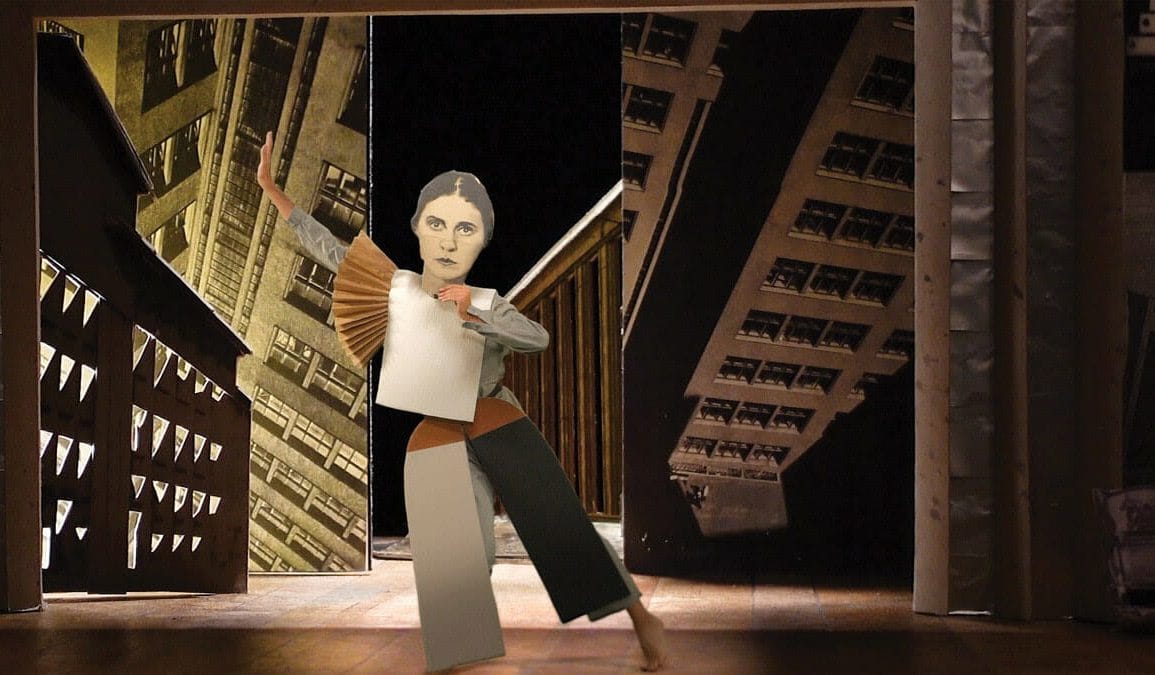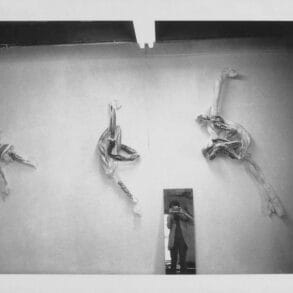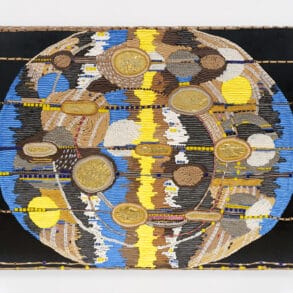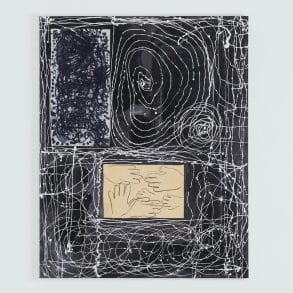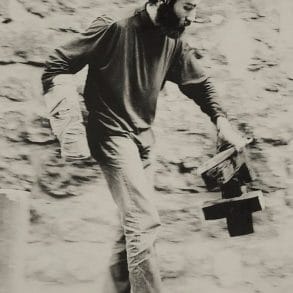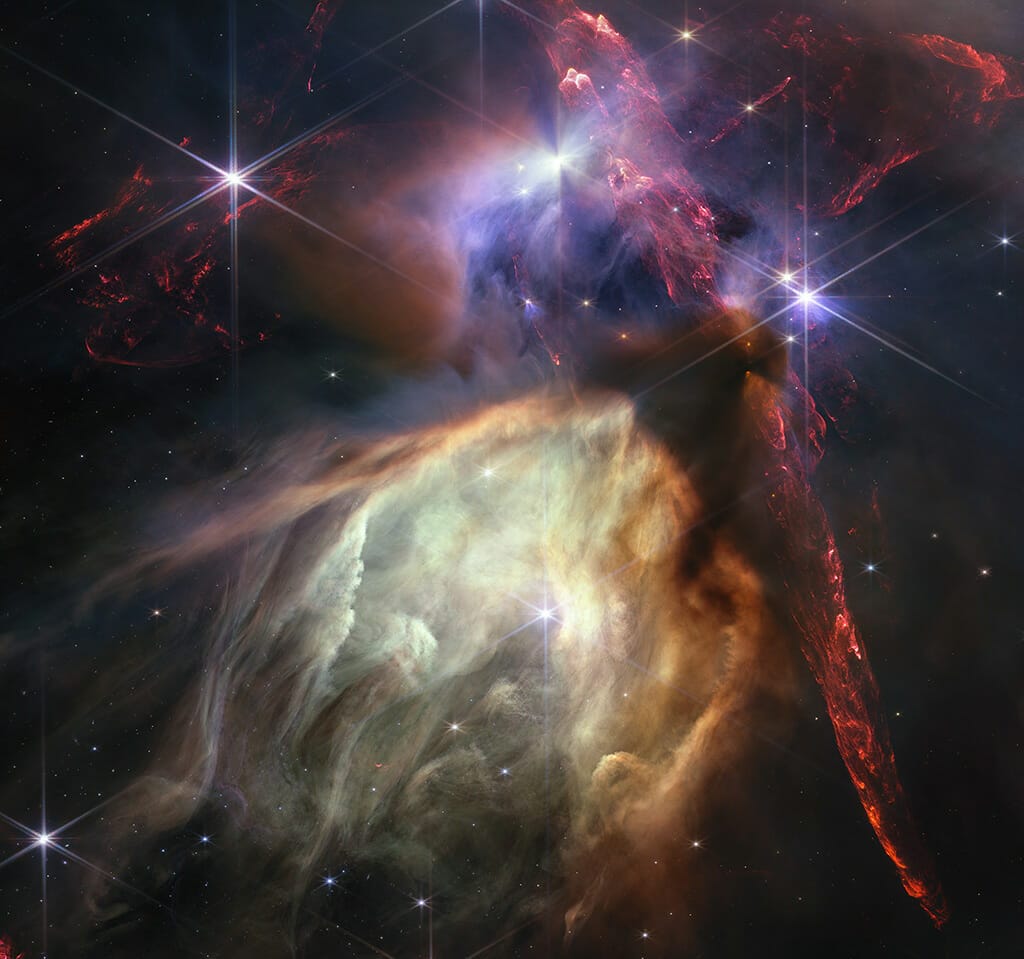Marian Goodman Gallery is delighted to present a solo exhibition by William Kentridge featuring Oh To Believe in Another World, an immersive five-channel projection made in response to Dmitri Shostakovich’s Symphony No.10. The exhibition marks the North American premiere of the film, which will be shown alongside a multi-disciplinary body of work which includes new bronze sculptures, drawings, collaged lithographs, and mixed-media puppets. This will be William Kentridge’s 19th solo exhibition with Marian Goodman Gallery, celebrating two and a half decades of representation.
The film explores history as a form of collage, traversing four decades of the Soviet Union from its early days following the 1917 revolution to the death of Lenin (1924); the suicide of Mayakovsky (1930); the assassination of Trotsky (1940); to the death of Stalin (1953). The work, grounded in Shostakovich’s complex relationship with the Soviet Union, illuminates both the febrile epoch and constraint of the time. The composer, initially lauded as the musical front of Soviet values, was denounced
twice under Stalin’s rule with the accusation that his compositions violated Soviet restrictions on cultural production, including formal experiments with contrast and ambivalent tonalities. This was the case for Symphony No.10, a symphony of emotion often perceived as an expression of the composer’s thoughts, which was not made public until after Stalin’s. “The report that remains of these decades is in the music of Shostakovich, the one who against expectation got away, and survived,” says Kentridge.
The film’s protagonists include Soviet intellectuals, politicians, and figures of the avant-garde, such as Lenin, Trotsky, Stalin, Mayakovsky, Lilya Brik, and Shostakovich himself, as well as his student Elmira Nazirova: “participants in the politics and culture of their time who embody the simultaneous hope in revolutionary ideals and the disillusionment of their failure in the lived world.” Here they populate a model of an imagined Soviet museum which becomes a makeshift dream world inhabited by historical film footage, ballerina puppets, Kentridge glyphs, lines from Mayakovsky’s poetry and plays, and slogans from the Russian Revolution. The audio component includes a montage of music by Russian composers, sampled and sliced to cacophonous effect to create a similar assemblage of sound. The fragmentation once denounced to Shostakovich by Stalin, is celebrated here. Mayakovsky, who serves as the main source for the intertitles, was an enthusiastic supporter in the early years of the revolution of the Soviet project and later grew disillusioned.
The characters in the film first materialize as small paper puppets, then evolve, with the collaboration of costume designer Greta Goiris, into life-sized puppets with collaged costumes inhabited by actors. A parallel series of puppets will be on view in the exhibition, constructed from an assemblage of tools and found objects drawn from Kentridge’s ‘universal archive’ in the studio. These sculptures with their vibrant whimsy and anthropomorphic silhouettes employ a Constructivist choreography of movement—a geometric skirt, a cone head, and newspaper legs. The figures form a dialogue with the new bronze glyph sculptures from Kentridge’s lexicon which seem to stand in for history—from the megaphone figure, Apron; coffee-pot witness, Pour; to the menacing feline, Stroke; all marching in procession with Seven Figures, 2023. A series of lithographs titled Portraits for Shostakovich features a cast of Soviet protagonists from the projection. Their disjointed and collaged visages mirror the fractured society of Soviet Union and the constraints upon artistic expression which necessitated self-censorship.
This exhibition expands on Kentridge’s keen interest and vast knowledge of Russian history particularly as it pertains to the
time of the Revolution, shedding light on its protagonists and its victims, both intellectual and political:
Political uncertainty, philosophical uncertainty, the uncertainty of images is much closer to how the world is. That’s something we’ve very much learnt the hard way through the 20th century; there are so many failures of grand ideas. — William Kentridge
The five-channel work Oh To Believe in Another World originates from a single projection film commissioned by the Lucerne Symphony Orchestra, Lucerne, Switzerland, which was shown there last summer as part of a series of orchestral performances that subsequently traveled to Pompeii and Johannesburg in 2022.
A retrospective exhibition titled William Kentridge: In Praise of Shadows, is currently on view at the Museum of Fine Arts, Houston. The exhibition, which will run through 10 September 2023, was organized by The Broad, Los Angeles, and was shown there from November 2022 through April 2023. A catalogue by the same title has been published on the occasion of the exhibition.
William Kentridge was born in 1955 in Johannesburg, South Africa where he currently lives and works. His work spans the socio-political conditions of living in post-apartheid South Africa to historical contingencies of today. For Kentridge, the process of recording history is one of constructing reconfigured fragments to arrive at a provisional understanding of the past—this act of recording, dismembering and reordering crosses over into an essential activity of the studio. His work spans a diverse range of artistic media such as drawing, performance, film, printmaking, sculpture and painting. Kentridge has also directed a number of acclaimed operas and theatrical productions.
Kentridge is the recipient of honorary doctorates from several universities including Yale, Columbia and the University of London. In 2012 he presented the Charles Eliot Norton lectures at Harvard University. In 2013 he served as Humanitas Visiting Professor in Contemporary Art at Oxford University, and Distinguished Visiting Humanist at the University of Rochester, New York, and in 2015 he was appointed an Honorary Academician of the Royal Academy of Arts in London. In 2017 he received the Princesa de Asturias Award for the Arts, Spain; in 2018, the Antonio Feltrinelli International Prize, Italy; and in 2019 he received the Praemium Imperiale award in painting in Tokyo. In 2022 he was presented the Honour of the Order of the Star of Italy. In 2023 he received the Olivier Award for Outstanding Achievement in Opera, London. Previous awards include the Kyoto Prize, Japan (2010), the Oskar Kokoschka Award, Vienna (2008), the Kaiserring Prize, Germany (2003), and the Sharjah Biennial 6 Prize (2003), among others.
Recent major exhibitions of his work have been shown at the Royal Academy of Arts, London (2022); Kunstmuseum Basel, Switzerland (2019); and a traveling show which opened at the Whitechapel Gallery, London in 2016 and traveled to subsequent venues, including the Louisiana Museum of Modern Art, Copenhagen, Denmark and the Museum der Moderne, Salzburg, Austria (2017). In 2016 his 500-meter frieze Triumphs and Laments was presented along the banks of the Tiber River in Rome. Notes Towards a Model Opera, shown at the Ullens Center for Contemporary Art in Beijing, China (2015) traveled as Peripheral Thinking to The National Museum of Modern and Contemporary Art, Seoul, South Korea (2015). A major traveling exhibition, Fortuna, toured multiple venues in Latin America from 2012-2015. Kentridge has participated in Documenta (2012, 2002, 1997) as well as the Venice Biennale (2015, 2005, 1999 and 1993).
Marian Goodman Gallery
79 Rue du Temple, 75003 Paris, France
